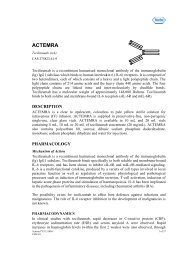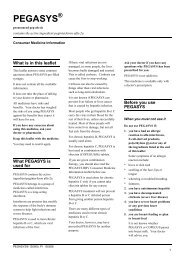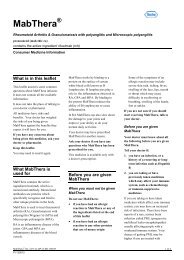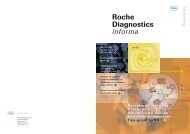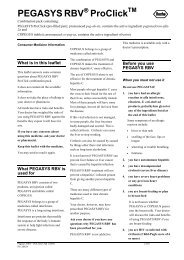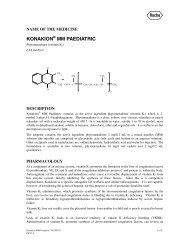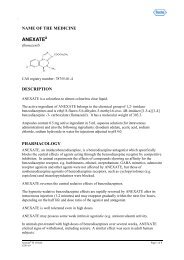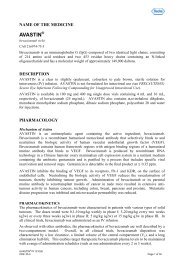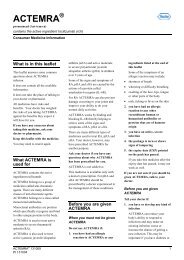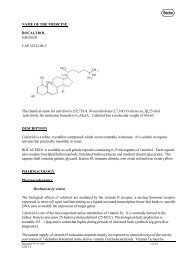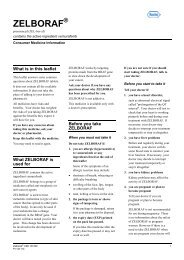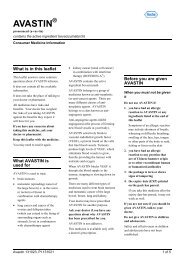Kredex (carvedilol) - Product Information (PI) - Roche Australia
Kredex (carvedilol) - Product Information (PI) - Roche Australia
Kredex (carvedilol) - Product Information (PI) - Roche Australia
You also want an ePaper? Increase the reach of your titles
YUMPU automatically turns print PDFs into web optimized ePapers that Google loves.
Risk of Anaphylactic Reaction: While taking beta-blockers, patients with a history of severe<br />
anaphylactic reaction to a variety of allergens may be more reactive to repeated challenge, either<br />
accidental, diagnostic or therapeutic. Such patients may be unresponsive to the usual doses of<br />
adrenaline used to treat allergic reaction.<br />
Non-allergic Bronchospasm (e.g., chronic bronchitis and emphysema): Patients with<br />
bronchospastic disease should, in general not receive beta-blockers. KREDEX may be used with<br />
caution.<br />
In clinical trials of patients with congestive heart failure, patients with bronchospastic disease were<br />
enrolled if they did not require oral or inhaled medication to treat their bronchospastic disease. In<br />
such patients, it is recommended that <strong>carvedilol</strong> be used with caution. The dosing<br />
recommendations should be followed closely and the dose should be lowered if any evidence of<br />
bronchospasm is observed during up-titration. (see Drug Interactions)<br />
Anaesthesia and Major Surgery: If KREDEX treatment is to be continued peri-operatively,<br />
particular care should be taken when anaesthetic agents which depress myocardial function, such as<br />
ether, cyclopropane, and trichlorethylene, are used. (see Overdosage and Drug Interactions<br />
sections)<br />
Phaeochromocytoma: In patients with this condition an alpha-blocking drug (eg phentolamine or<br />
phenoxybenzamine) should be administered before the beta-blocker to avoid exacerbation of<br />
hypertension. Although <strong>carvedilol</strong> has both alpha- and beta-blocking pharmacological activities,<br />
there is no experience with its use in this condition. Therefore, caution should be taken in the<br />
administration of <strong>carvedilol</strong> to patients suspected of having phaeochromocytoma.<br />
Carcinogenicity<br />
Repeat dose toxicity studies showed an increase in the incidence of bile duct hyperplasia in rats at<br />
doses greater than 34mg/kg/day following 12 and 18 months dietary treatment with <strong>carvedilol</strong>, and<br />
in dogs receiving doses greater than 30mg/kg/day for 12 months. Focal hepatocellular hyperplasia<br />
was noted in rats at oral doses greater than 100mg/kg/day at 3 months and greater than<br />
30mg/kg/day at 12 months of treatment with <strong>carvedilol</strong>. Hepatocellular hyperplasia was not noted<br />
in dogs at doses up to 300mg/kg/day. In addition, there was a small increase in the incidence of<br />
hepatic adenomas in rats receiving <strong>carvedilol</strong> at doses greater than 100mg/kg/day in the 18 month<br />
dietary study. There was no increase in the incidence of hepatic adenomas in the rat 2 year dietary<br />
carcinogenicity study, in which the average dose was 75mg/kg/day. Based on AUC, this dose<br />
showed a 9 to 15 fold higher systemic exposure when compared to a dose of 50mg/day in humans.<br />
A carcinogenicity study in mice was negative at dietary doses up to 200 mg/kg/day. Therefore, the<br />
carcinogenic risk to humans following long-term administration of <strong>carvedilol</strong> appears to be low.<br />
Use During Pregnancy (Category C)<br />
There is no adequate clinical experience with <strong>carvedilol</strong> in pregnant women<br />
Studies in rats have shown that <strong>carvedilol</strong> and/or its metabolites cross the placental barrier. Betablockers<br />
may cause bradycardia in the foetus and newborn infant. During the later stages of<br />
<strong>Kredex</strong> ® <strong>PI</strong> 110720<br />
CDS 5.0 12 of 24



